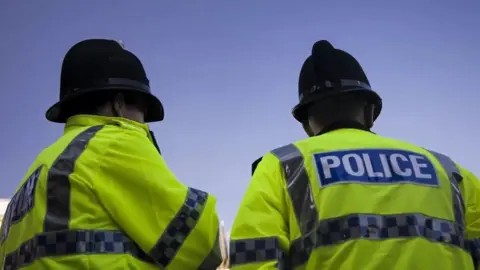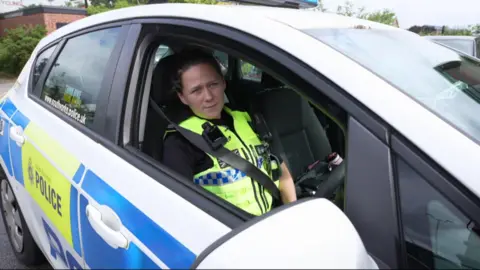Police in England to attend fewer mental health calls
 Getty Images
Getty ImagesPolice officers in England will no longer respond to concerns about mental health if there is no risk to life or crime being committed, under new plans.
The government says the policy could save a million hours of police time every year.
Senior officers say forces have "lost their way" by dealing with less serious mental health problems.
But mental health charities say they are "deeply worried" at what could be a "dangerous" change.
At the moment, some police forces in England and Wales attend 80% of so-called health and social care incidents.
It is expected this will be reduced to between 20 and 30% within the next two years, under the plans.
The government says it is providing an extra £1bn a year, including £150m for facilities to replace police officers, including:
- specialist mental health ambulances
- extra capacity for treating patients
- "crisis cafes", where people struggling to cope can drop in for help
And 999-call handlers are being trained to assess a request for officers to attend and decide whether:
- someone's life is at risk
- there is a threat to the public
- a possible crime is being committed
But Mind chief executive Dr Sarah Hughes said mental health services were "not resourced to step up overnight".
Dr Hughes told BBC Breakfast that the system wasn't "ready" and that mental health services were "not fully equipped" to help the number of people in need.
"We're nowhere near a situation where services are in a strong enough place to pick up the slack," she added.
The additional funding had been announced in 2021, the charity said, so there was no new money to pay for additional referrals from the police, at a time of growing demand for mental health services.
However, the government's policing minister Chris Philp told the BBC's Today programme he was "confident it will be safe".
"We do need additional mental health capacity," he acknowledged, adding that the government was investing more in mental health provisions.
Mr Philp said the plans won't be rolled out with a "big bang" on day one, but instead will be decided in "discussion with police and the local health partners".
Having tested the policy during the past three years, Humberside Police said it had saved an average of 1,441 hours of police time a month.
Three other forces, Hampshire, Lancashire and South Yorkshire, are also starting to introduce the policy, to be implemented across England within three years.

In Sheffield, 999-response officer PC April Clark was recently called to a man trying to throw himself from a first-floor window.
"It is quite literally in my hands," she said.
"You can't let them go. You can't let anything happen to them. You've got to do what you can for them and their family until the right help comes along."
She has also dealt with a young mother's suicide.
These are both cases in which officers would still attend.
But PC Clark said she also regularly handled calls from NHS staff and members of the public "going home for the weekend in their nine-to-five jobs", asking the police for a ''welfare check" on someone with mental health issues.
Officers can end up sitting with patients for 12 hours and more in hospitals, because no-one else is available and NHS staff are concerned about the risk to the patient, staff or public.
'Feel criminalised'
An early assessment of the impact of the changes in Humberside Police concluded that police turned down requests to carry out welfare checks, or look for patients who had gone "AWOL". They also handed over the care of patients more quickly to the health service.
This meant more patients were seen by health service staff with appropriate training rather than police officers.
Deputy Chief Constable Rachel Bacon, from the National Police Chiefs' Council said the new approach would be better for people in mental health crises who tended to "feel criminalised" when officers turned up to help them. Some mistakenly believed they were under arrest.
Currently, officers are sometimes required by law when someone is detained under the Mental Health Act, allowing them to be taken to a place of safety, possibly against their will.
But the National Police Chiefs' Council plans to ask the government to change this.

How do you think urgent mental health issues should be dealt with? Do you have any experience of helping someone suffering a mental health crisis?
You can get in touch by emailing us [email protected].
Please include a contact number if you are willing to speak to a BBC journalist. You can also get in touch in the following ways:
- WhatsApp: +44 7756 165803
- Tweet: @BBC_HaveYourSay
- Upload pictures or video
- Please read our terms & conditions and privacy policy
If you are reading this page and can't see the form you will need to visit the mobile version of the BBC website to submit your question or comment or you can email us at [email protected]. Please include your name, age and location with any submission.
